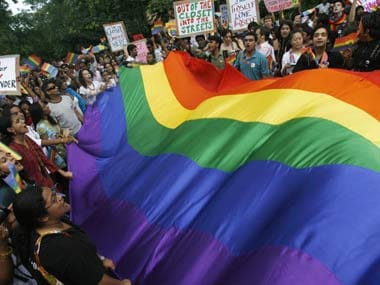M4PNews|Delhi
The Supreme Court on Monday decided to reconsider the constitutional validity of Section 377 of the Indian Penal Code which has been used to de-criminalise homosexuality.
A bench headed by Chief Justice Dipak Misra and comprising of Justice AM Khanwilkar and Justice DY Chandrachud decided to re-examine the top court’s earlier order upholding section 377 of the Indian Penal Code. “Our earlier order needs to be reconsidered,” said Justice Misra on Monday.
Section 377 of the IPC refers to ‘unnatural offences’ and says whoever voluntarily has carnal intercourse against the order of nature with any man, woman or animal, shall be punished with imprisonment for life, or with imprisonment of either description for a term which may extend to ten years, and shall also be liable to pay a fine.
The petition in the present case was moved by five people who belong to the gay community. They have argued that they are affected by the judgment and since the Supreme Court has itself declared the Right to Privacy a Fundamental Right, they cannot be denied their right to sexual privacy. They said that they live in fear of the police because of their natural sexual preferences. The petitioners also argued that most nations have decriminalised homosexuality and India should not lag behind on the issue.
The petition requires the Supreme Court to reconsider its 2013 judgment in Suresh Kumar Kaushal versus Naz Foundation which upheld the legalities of Section 377. The judgment had struck down the Delhi High Court judgment decriminalising homosexuality. The court said that the confines of law cannot trample on right to life and liberty, people who exercise their choice should not live in fear. While referring the matter to a larger bench the court observed “what is natural to one may not be natural to others”.
The court has also asked the Centre for its stance on the issue. This makes matters interesting as none of the political parties have stuck their head out on homosexuality. The right-wing BJP will now have to make clear its stance on the issue.

Representational image. Reuters
Further, since a law has been challenged in the present case, the court said that it would be appropriate to form a constitution bench to look into the matter. It is expected that the matter will be heard along with the curative petitions in the Naz Foundation case and the case should come up for hearing after four weeks, though a concrete date has not yet been decided.
In 2001, Lawyers Collective, on behalf of the Naz Foundation had filed a writ petition in the Delhi High Court in 2001, challenging the constitutionality of section 377 on the grounds that the draconian law grossly violates the right to privacy, dignity and health under Article 21, equal protection of law and non-discrimination under Articles 14 and 15 and freedom of expression under Article 19 of the Constitution. A notice was issued to Union of India in 2002 and the Attorney General was asked to appear. In 2004, the petition was dismissed by the High Court (citing lack of action). A review petition was then filed against the dismissal, which ironically was dismissed too and then after a Special Leave to Appeal was filed in 2005, a year later the Supreme Court said, “the matter does require consideration and is not of a nature which could have been dismissed on the ground afore-stated.”
Before India could take its first steps towards progress however, the Supreme Court quashed Delhi High Court judgement in 2013 and declared that it was a judicial overreach and that it was not “for courts to create the law” according to the two-judge bench headed by Justice GS Singhvi. The Supreme Court backed out, but passed the ball to the Parliament to review a law that considered private sexual activity criminal.
Right to Privacy
When the nine-judge bench of the Supreme Court declared privacy a Fundamental Right, it invited much cheer from many sections of the society, including the LGBT (Lesbian, Gay, Bisexual and Transgender) community in India.
In its landmark judgment, the Supreme Court said that “sexual orientation is an essential attribute of privacy”. “Discrimination against an individual on the basis of sexual orientation is deeply offensive to the dignity and self-worth of the individual,” it said. The 547- page judgement also added that the Right to Privacy and the protection of sexual orientation lie at the core of the fundamental rights guaranteed by articles 14, 15 and 21 of the Constitution.
Justice DY Chandrachud, one of the nine judges, said, “Privacy includes at its core the preservation of personal intimacies, the sanctity of family life, marriage, procreation, the home and sexual orientation. Privacy also connotes a right to be left alone.”
“LGBT rights cannot be dismissed as so-called rights,” said the apex court.